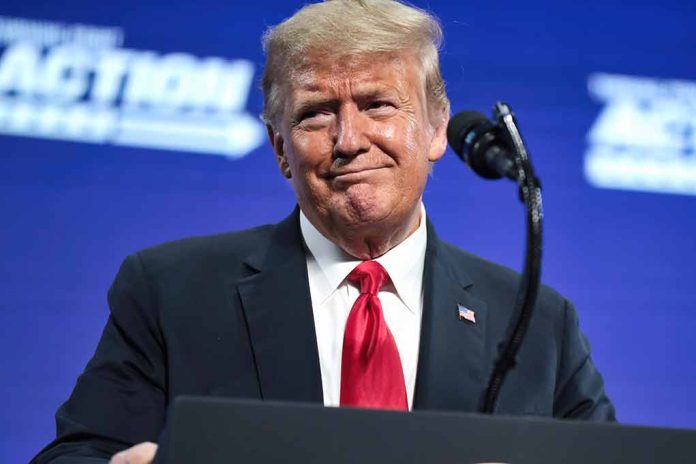
President Trump’s executive order redirects funding from illegal immigrant services to house 6,000 homeless veterans by 2028, prioritizing American heroes over border-crossers for the first time in decades.
Key Takeaways
- President Trump has established the National Center for Warrior Independence on the West Los Angeles VA campus to house up to 6,000 homeless veterans by 2028.
- The executive order redirects federal funds previously allocated for illegal immigrant housing and services to support American veterans.
- The initiative will provide comprehensive services including housing, substance abuse treatment, and job support for veterans.
- Los Angeles has approximately 3,000 homeless veterans—the highest concentration in any American city—who will be directly served by this new center.
- The Department of Housing and Urban Development will issue vouchers to support homeless veterans across the country as part of the broader initiative.
America First: Veterans Before Illegal Immigrants
In a decisive policy shift, President Trump signed an executive order establishing the National Center for Warrior Independence on the West Los Angeles VA campus. This landmark initiative aims to provide housing for up to 6,000 homeless veterans by 2028, addressing a crisis that has persisted for far too long. The most significant aspect of the order is its funding mechanism—redirecting federal dollars previously earmarked for housing and services for illegal immigrants to instead support American veterans who served their country honorably. This represents a clear commitment to the “America First” agenda that prioritizes citizens, especially those who have sacrificed for the nation.
The executive order tasks VA Secretary Doug Collins with transforming the sprawling West LA campus into a comprehensive support center that goes beyond mere housing. Veterans will receive access to substance abuse treatment programs, mental health services, and employment assistance, creating a pathway back to stability and dignity. Los Angeles currently houses approximately 3,000 homeless veterans—roughly 10% of America’s total homeless veteran population—making it a logical starting point for this national initiative. Many of these veterans currently survive in deplorable conditions on the city’s infamous “skid row,” a situation the administration deems unacceptable.
Correcting Past Mismanagement
The West Los Angeles VA campus has faced significant controversy in recent years due to mismanagement of its resources. A September 2024 court ruling declared illegal the VA’s practice of leasing portions of the property to private entities, including a private school, businesses, and the UCLA baseball team—often at below-market rates. This practice diverted valuable resources away from their intended purpose of supporting veterans. Trump’s executive order explicitly addresses this issue, redirecting the campus back to its original mission of serving those who served America.
“This order will ensure VA’s West Los Angeles Campus is being used as intended: to benefit veterans,” said Secretary Collins.
The initiative has received strong support from veterans advocacy groups. The Veterans Collective, which has been fighting for proper use of the campus, “enthusiastically applauded” the executive order. Iraq War veteran Rob Reynolds called it “a huge win” for the veteran community, noting that many veterans he’s spoken with are “very happy to see that the White House has taken this position about the West Los Angeles VA.” This positive reception underscores the significance of the initiative for those who have long advocated for better treatment of America’s heroes.
National Strategy with Local Focus
While the National Center for Warrior Independence is centered in Los Angeles, the executive order establishes a nationwide strategy to combat veteran homelessness. The Department of Housing and Urban Development will issue housing vouchers to support homeless veterans across the country, extending the impact beyond California. The Veterans Collective has set an ambitious goal of completing 1,200 supportive housing units by the end of Trump’s current term, demonstrating the urgency with which this issue is being addressed.
“The Department of Veterans Affairs (Department) leased parts of the property to a private school, private companies, and the baseball team of the University of California, Los Angeles, sometimes at significantly below-market prices,” Trump stated in the executive order.
The executive order is part of a broader set of reforms to the VA system, including expanded healthcare access, disciplinary actions for underperforming staff, and a feasibility study for a full-service VA medical center in New Hampshire. This comprehensive approach recognizes that veteran homelessness is just one aspect of the challenges facing those who have served. By addressing multiple issues simultaneously, the administration aims to significantly improve overall veteran welfare while maintaining its focus on the housing crisis.
Shifting Priorities
This initiative follows a previous executive order ending taxpayer-funded benefits for undocumented immigrants, reinforcing the administration’s policy of putting American citizens first. Critics have argued that undocumented immigrants are already largely barred from receiving federal benefits, but the administration has identified numerous programs and services that have been redirected toward non-citizens. The reallocation of these funds to veteran services represents a tangible shift in national priorities that puts Americans, especially those who have served their country, at the forefront.
“As of 2024, there were approximately 3,000 homeless veterans in Los Angeles, more than in any other city in the country and accounting for about 10 percent of all of America’s homeless veterans. Many of these heroes live in squalor in Los Angeles’s infamous “ skid row ” Trump noted in the executive order.
The initiative builds upon previous Trump-era policies to expand care options and reduce drug costs for veterans. Veteran homelessness has already decreased by 55.6% since 2010, but the administration recognizes that much work remains to be done. By focusing resources on this persistent problem and approaching it with unprecedented determination, Trump’s executive order aims to make a substantial impact on the lives of those who have sacrificed for their country only to find themselves without proper support upon returning to civilian life.



